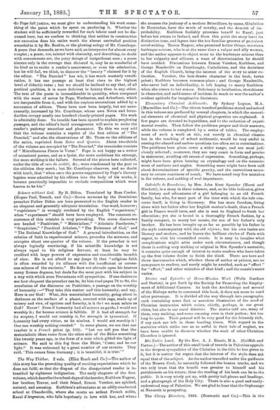Science without God. By H. Didon. Translated by Rosa Corder.
(Kegan Paul, Trench, and Co.)—Seven sermons• by the Dominican preacher Father Didon are here presented to the English reader in an eloquent and generally adequate translation. One word, however ; " exp6rience " is wrongly rendered by the English "experience," when "experiment" should have been employed. The constant re- currence of this mistake is very provoking. The seven discourses are beaded "Positivism," "Materialism," "Atheistic Pantheism," "Scepticism," "Practical Atheism," "The Existence of God," and "The Rational Knowledge of God." A general introduction, on the relation of faith to experimental science, precedes the sermons, and occupies about one-quarter of the volume. If the preacher is not always logically convincing, if his scientific knowledge is not always equal to his religions fervour, at least he may be credited with large powers of expression and considerable breadth of view. He is not afraid to say (page 3) that "religions faith is often retarded by its alliance with the insufficient or errone- ous science of the ancients." He does not obtrude upon his hearers many Roman dogmas, but deals for the most part with his subject in a way with which even Protestants will sympathise. If one desires to see how eloquent the preacher can be, let him read pages 78 to 80, the conclusion of the discourse on Positivism, a passage on the worship of humanity :—" They take this matter and this humanity, and say, Here is our God! What, this materialised humanity, going about in darkness on the surface of a planet, covered with rags, made up of misery and vice, of egotism and ferocity, is it thet we must salute as God P Never ! Even if humanity had all sciencs, as guide, I would not worship it ; for human science is fallible. If it had all strength for its sceptre, I would not worship it, for strength is tyrannical. If humanity had every virtue, as its nimbus, I would not worship it ! One can worship nothing created." In some places, we see that our teacher is a French priest (p. 103). "Let use tell you that the materialistic ideas came from the other side of the Rhine something like twenty years ago, in the form of a mist which gilded the light of science. We said to this fog from the Rhine, Come, and be our light !' It was welcomed by a great number of our savants. They said, This comes from Germany ; it is beautiful, it is true."


































 Previous page
Previous page